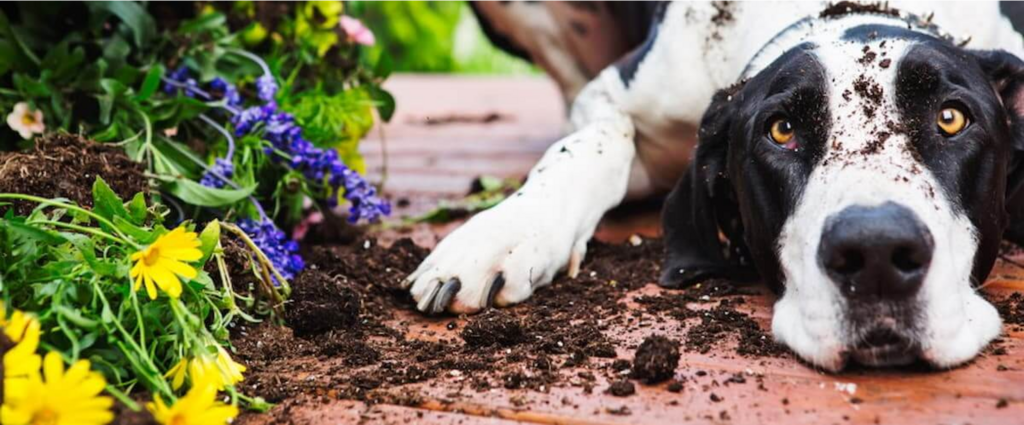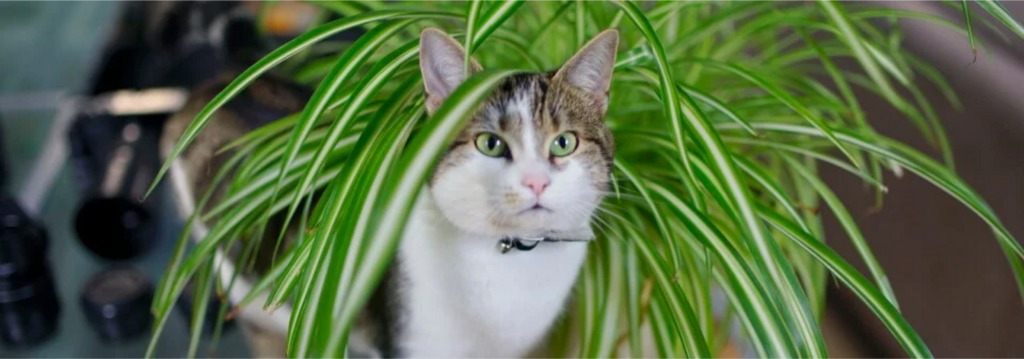Last Updated: 02/09/2025
Poisonous Plants For Pets
Check out our list of poisonous plants and pet-friendly alternatives!
Author: Dr Belinda Stancombe BVSc (Hons)
Reading Time: 3 minutes - short read
Our pets are naturally curious and are known for getting into all sorts of mischief! Owning a pet can be a big responsibility and keeping them safe is an important part of pet ownership, with some dangers more obvious than others.
Many common backyard and indoor plants are poisonous to pets, with ingestion resulting in a range of symptoms from gastrointestinal upsets to seizures or even death.
Our vets have listed 20 common household plants that are poisonous to dogs and cats, ways to prevent your pet from destroying your garden and pet friendly plants for you to enjoy! Keep your pet safe this summer!
WARNING: If you believe your pet has consumed or has been in contact with a toxic plant please immediately contact your local vet, 24hr vet emergency centre or call the Australian Animal Poisons Helpline on 1300 TOX PET (1300 689 738). Delaying treatment may worsen the symptoms.
Plants Toxic for Dogs and Cats
WARNING: Lilies are very common in flower arrangements. If you are giving flowers as a gift to a friend with cats, ensure it does not contain lilies as they are highly toxic!
FACT: In some areas of the world such as Turkey, people have suffered from Rhondodendron poisoning when they have consumed 'Mad Honey'. This honey is collected by bees from the nectar of Rhondodendron flowers, high in grayanotoxins which accumulate in the stored honey.
WARNING: Eucalytus Oil is a common ingredient in antiseptics, insect repellents and cough drops. Ingestions of ANY product containing high levels of Eucalyptus Oil can results in toxicity. Take care to ensure these products are kept safely away from your pet!
Did You Know: While the Aloe Vera plant can be toxic when ingested, the sap or gel is widely used for it's medicinal purposes and is a common ingredient for both human and pet skin care. Products containing Aloe Vera such as Aloveen Shampoo and Conditioner and Pet Drs Hotspot Gel are soothing to sensitive skin and widely recommended.
Do You Have An Itchy Pet? Discover the common causes of Itchy Skin in Dogs and Cats by reading our veterinary written articles: How To Stop Your Dog Scratching and Causes of Itching In Cats.
How to Stop Your Pet From Eating Plants

While removing all potentially toxic plants from your house and garden is the safest options when it comes to pets, this is not always possible. For pet owners who are renting or live in an apartment, removing plants from the garden is often not allowed. In these cases, keeping your pet separate from any harmful plants may be the best option.
1. Create Barriers
For Dogs:
Consider fencing off areas of the garden which you do not want to give your pet access to.
Puppies are particularly mischievous and tend to get into many things that adult dogs don't even bother about. If you have a puppy consider keeping your puppy in a crate, playpen or gated room, safe from any potential risks when you are not home or are unable to monitor them.
If you are worried about what your dog gets up to during the day when you are not home, consider setting up a Pet Camera. Connecting to your home's WiFi network, monitor live video of your pet on your phone any time during the day to ensure they are safe and staying out of trouble.
For Cats:
For cats, keeping them indoors, will keep them safe from wandering and protect them from any potentially toxic outdoor plants.
A safe way to exercise your cat outdoors is by walking them on a harness and lead or consider a longer adventure in a pet backpack.
2. Use a Deterrent
For areas that are difficult to fence, try using a repellent spray or a chew deterrent spray such as Tropiclean Stayaway Spray, which can even be used on plants.
Water can be a great deterrent in the garden for pets that do not enjoy getting wet. Try setting up a timed sprinkler to spray on the area of the garden that you do not want your pet accessing. Not only will this keep water-hating pets out, but it will ensure that your garden stays well watered!
3. Provide Environmental Enrichment
A bored pet is a mischievous pet!! If you pet has nothing to do, they are more likely to get into things like your garden and chew on plants, dig holes and generally just get up to no good!
For Dogs:
Keep your dog busy by providing them with a range of Interactive Toys or Long Lasting Treats. This is a great way to exercise their body while stimulating their mind, and prevent problem behaviours.
Durable rubber chew toys satisfy your dogs natural urge to chew while keeping them occupied. The addition of a lickable paste treat and dogs can spend hours trying to clean up every last morsel. Try freezing in summer for a longer-lasting treat.
For Cats:
Keep your cat busy with a selection of interactive toys, to exercise their body and mind. Lick mats are designed to keep pets stimulated and entertained, reduce boredom and anxiety, as well as slow those that eat too quickly. Lick Mats can be loaded with pastes such as creamy treats or wet food for a long lasting treat.
Cats love to go vertical. Providing your cat with a selection of scratchers and cat trees to allows them to explore and exercise their natural climbing instincts.
Some cats enjoy grazing on grass from time to time and it provides them with a important source of environmental enrichment. Providing your indoor cat with fresh cat grass or cat nip is a great way to fulfil this natural instinct.
Pet Friendly Plants

If you are planning to redo or add to your current garden or indoor plant collection, there are a wide variety or pet friendly plants to choose from.
- Spider Plant
- Calathea
- Blue Echeveria
- Mistletoe Cactus
- Bird's Nest Fern
- Hoya Wax Plant
- Jasmine or Star Jasmine
- Native Bottlebrush
- Bromeliads
- Golden Palm (Areca)
- Boston Fern
- Venus Flytrap
- Orchid
- Date Palm
- Kentia Palm
- Ponytail Plant
- Pilea
- African Violet
- Polka Dot Plant
- Air Plants
For a comprehensive list of Toxic and Non-toxic plants for dogs and cats, visit the ASPCA Website.
Further Reading
Want to read more? Check out our other articles:
Flea, Tick and Worming Guide For Dogs
History
Our experts continually monitor the health and wellness space and we update our articles when new information becomes available.
Tue Mar 25 2025
Edited by Dr Teagan Lever BVSc (Hons)Dr Belinda Stancombe BVSc (Hons)
Veterinarian
Dr Belinda graduated from The University of Queensland in 2009 and has worked as a Small Animal Veterinarian for over 10 years in South East Queensland. She also has experience as a telehealh consultant, providing veterinary advice for online customers.She has a special interest in animal behaviour, preventative health, the human-animal bond and internal medicine. Outside of work hours she is closely affiliated with a kitten rescue and is also a devoted carer of orphaned rescue kittens.





